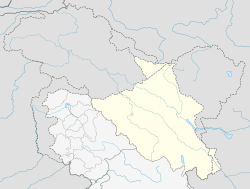| Stakna Monastery | |
|---|---|
 Stakna Stakna | |
| Religion | |
| Affiliation | Tibetan Buddhism |
| Sect | Drugpa |
| Location | |
| Location | Stakna, Leh district, Ladakh, India |
| Country | India |
 | |
| Geographic coordinates | 34°0′18″N 77°41′5″E / 34.00500°N 77.68472°E / 34.00500; 77.68472 |

Stakna Monastery or Stakna Gompa is a Buddhist monastery of the Drugpa sect in Stakna, Leh district, Ladakh, northern India, 21 or 25 kilometres from Leh on the left bank of the Indus River.
It was founded in the late 16th century by a Bhutanese scholar and saint, Chosje Modzin. The name, literally meaning 'tiger's nose' was given because it was built on a hill shaped like a tiger's nose. Of note is a sacred Arya Avalokitesvara statue from Kamrup, Assam. Stakna has a residence of approximately 30 monks.
It is the only Bhutanese Drukpa Kagyu monastery in Ladakh, headed by the Je Khenpo in Bhutan, whereas the other Drukpa monasteries in Ladakh are of the Gyalwang Drukpa's school, based at Hemis. This split in the Drukpa Kagyu lineage occurred in the 17th century when there was a dispute over who was the true reincarnation of the 4th Gyalwang Drukpa.

See also
References
- ^ "Stakna Gompa". Buddhist-temples.com. Retrieved 19 October 2009.
| Capital: Kargil; Leh | |||||||||||||||||||
| State symbols | |||||||||||||||||||
| History |
| ||||||||||||||||||
| Administration | |||||||||||||||||||
| Geography |
| ||||||||||||||||||
| Human settlements | |||||||||||||||||||
| Culture |
| ||||||||||||||||||
| Tourism and wildlife |
| ||||||||||||||||||
| Transport |
| ||||||||||||||||||
| Infrastructure |
| ||||||||||||||||||
| See also |
| ||||||||||||||||||